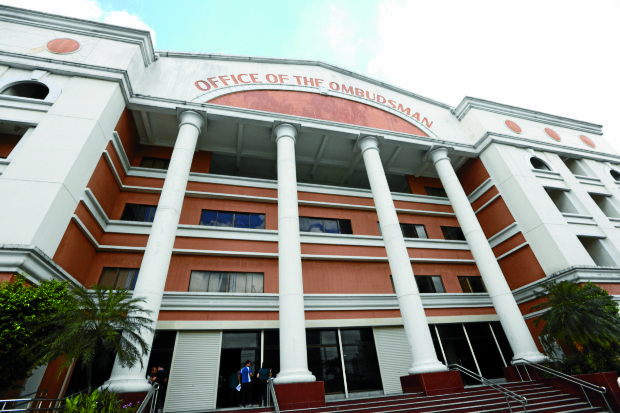Ombudsman ‘foot-dragging’ costs P6.1-B PNCC case
The case against several officials of the state-run Philippine National Construction Corp. (PNCC) over an anomalous P6.1-billion debt settlement is the latest casualty of alleged investigation delays by the Office of the Ombudsman.
In a 42-page resolution, the Sandiganbayan First Division granted the motions to dismiss filed by former board chair Renato Valdecantos, president and chief executive officer Ma. Theresa Defensor, president and CEO Rolando Macasaet, and chief operating officer Arthur Aguilar
Also cleared were former board members Erwin Tanunliong, Hermogenes Concepcion Jr., Ottomama Benito, Enrique Cuejilo Jr., Roy Eduardo Lucero, Fermin Lusung Sr., Jeremy Parulan, and Antonio Villar.
READ: Graft raps vs Parojinogs junked due to inordinate delay
The Sandiganbayan faulted the Office of the Ombudsman for failing to take action on the August 2006 compromise agreement with Radstock Securities, Ltd., as soon as former PNCC president Luis Sison began assailing it that year.
Article continues after this advertisementState prosecutors had charged the PNCC with violating Section 3(e) of the Anti-Graft and Corrupt Practices Act because the deal with Radstock was allegedly disadvantageous to the government.
Article continues after this advertisementRadstock had bought out the rights of Marubeni Corp. to the Marcos-era debt owed by PNCC; the lender proceeded to sue the state firm for the money afterwards. The settlement was meant to settle Radstock’s pending collection suit at the Court of Appeals.
But, the Supreme Court in 2009 granted Sison’s petition to nullify the agreement for containing excessive concessions that were “contrary to law.” This partly served as basis for the criminal indictment of the PNCC officials.
NO ACTION IN 2006
However, the Sandiganbayan found that the Office of the Ombudsman violated the accused officials’ right to the speedy disposition of their cases.
The court noted that as early as July 2006, Sison had already complained about Aguilar at the now-abolished Presidential Anti-Graft Commission, which forwarded the case to the Ombudsman.
It said Ombudsman “did not take action” on Sison’s complaint for more than four years. The case was “put into oblivion” until Sison filed another complaint in September 2010 against Aguilar, this time alongside the other PNCC officials and on the strength of the SC’s decision to strike down the Radstock deal.
For the court, this meant the Ombudsman took 10 years and four months to wrap up preliminary investigation on Aguilar’s case on Nov. 3, 2015, and file the charges on Nov. 25, 2016.
The resolution explained that Sison’s first complaint “cannot be separated” from his second one because they covered the same transaction. It pointed out that the Ombudsman could have begun probing the deal as early as 2006, “independent of the actions brought by Sison” before the CA and then the SC.
“This is to make a point that the investigation on the questioned board resolutions could have been possibly done, at least as far as Aguilar is concerned, as early as 2006, considering that the pertinent documents cited in [the SC ruling] must have already been in existence,” it added.
ECHO OF SC RULING
As for the other accused whom Sison sued in 2010, the court still considered the six-year period spent at the Ombudsman’s level to be unjustified.
The court said the existence of the SC ruling annulling the deal should have already afforded the Ombudsman “a rather less intricate start,” since its pronouncements “had already provided the main and essential groundwork for preliminary investigation.”
It pointed out that the Ombudsman’s resolution on the finding of probable cause against the officials are “essentially an echo” of the SC decision anyway.
WITHDRAWN CHARGES
At the same time, the court also approved the prosecution’s withdrawal of charges against former board members Braulio Balbas Jr., Romulo Coronado, Basilio Cruz Jr., Victor Pineda Jr., and Marvin Paule.
Prosecutors had asked to withdraw the cases so they can file another set of information that would allege “conspiracy” among the board members. Balbas, Coronado, Cruz, Pineda, and Paule did not object.
But, the court had to deny the withdrawal of the case against former board member Raymundo Francisco, because he objected on the grounds that it would violate his right to be informed of the allegations against him.
Francisco argued the issue of conspiracy was not taken up during preliminary investigation, and the court agreed that the prosecution “cannot conveniently introduce an allegation by simply withdrawing the Information with the anticipation of filing an amended one.”
Thus, Francisco remains the last PNCC official with a pending case related to the Radstock deal.
Upon inquiry, First Division sources also said that former Government Corporate Counsel Agnes Devanadera continues to face the graft case for advising the PNCC to enter into the debt settlement.
Under the voided agreement, the PNCC agreed to recognize its liability of P6.185 billion, and to settle this, it gave Radstock 19 government-owned real properties worth P3.188 billion.
The PNCC also assigned shares to Radstock worth P713 million, equivalent to 20% of the state firm’s capital stock. The company also signed away half of the its 6% share in the gross toll revenue of the Manila North Tollways Corp., from 2008 to 2035, approximately valued at P1.287 billion.
Prosecutors claimed the PNCC’s assignment of “substantially all of its assets” in order to pay its obligations to Radstock was prejudicial to its other creditors, including the national government.
In the 2009 SC ruling, decision writer Antonio Carpio dubbed the agreement as “pillage of the public coffers that ranks among one of the most brazen and hideous in the history of this country.” CBB/rga
